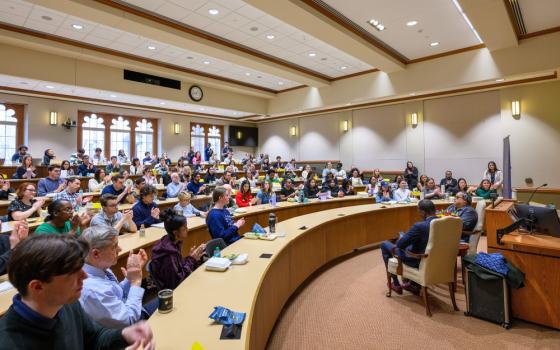This past weekend was a fine one for religious life in the U.S. On Friday I participated in the 16th National Congress of the Religious Formation Conference in Denver and on Sunday, 60 religious women of the Archdiocese of Los Angeles gathered at the Pauline Center for Media Studies in Culver City for the "Women of Faith" lecture series. Both events were energizing and reinforced my belief that religious women and men believe in their vocation and are working hard to grow spiritually and foster vocations and the perseverance of new members. I wish so many more religious could have been there.
I wrote the following based on my handwritten notes and those tapped into my iPhone.
Sr. Donna Markham, the prioress general of the Adrian Dominicans, presented a morning session at the religious formation conference: "Blessing and Hope: Creating a Vision for Religious Life in the 21st Century." She spoke of dreaming and quoted Don Helder Camera, "When we are dreaming alone it is only a dream. When we are dreaming with others, it is the beginning of reality."
Donna led the more than 300 sisters and brothers present from so many congregations to an experience of dreaming about possibilities for the future of our religious communities. Social dreaming, she said, invites people to activate the power of community and the dream to create a new communal culture. The typical community approach to culture has two dimensions: What's happening now and what is likely to happen in the future? Or where are we? And where are we going? But this approach leads to a quagmire of problems without solutions, or patch-ups that can work for a bit, but without long term results or growth.
Dreaming works with the possibilities of communal transformation, clarity, learning based on communal reflection on a deep level. We cannot problem-solve our way out of a situation. Social dreaming together leads us to discover possibilities; we examine life and mission in the process of being dreamt.
What are the implications of dreaming together? We listen to dreamers, fresh perspectives, imagining a world with few limitations, that we can be something for the world. Through active imagining dreamers create the future through new ways of reframing our rich religious traditions.
Donna then used six points that resulted from the CARA survey about what young people want from religious life: belonging, identity, education, communal living, engagement in ministry and relationship with the church. She gave examples from her experiences with those in formation in her congregation.
Things she learned about the desires of those in formation are future possibilities, appreciation of gifts, hospitality and affection.
Donna concluded by saying, "Only those who dream ought accept the role of formator. … Those whose imaginations are rich have high energy, boundless joy, no fear of failure and an uncompromised Gospel-driven idea of community."
I presented in the afternoon and missed the opportunity to hear a canon-civil lawyer speak via video conferencing, about the on-going visitation of congregations of religious women in the USA. The conference was marked by serenity, and the love the sisters and brothers have for their congregations and charisms was tangible and so very hopeful.
The talks can be ordered from the National Formation Conference.
Last Sunday, in her third presentation in the "Women of Faith" series "Trilogy of the Vows: Radical Expressions of Love", Notre Dame Sr. M. Regina Robbins spoke about "Fruitful Poverty". She began by saying that "if the vows are not helping to transform us, then they are just words, words, words." Poverty is not about what we don't have but how it enhances our freedom to live the vow. Poverty is the fundamental vow, but all the vows are based in charity. Poverty is "the fundamental umbrella for a constellation of attitudes and values" to follow Christ in religious life.
One question Regina, a former novice director, asked that impressed me was, "Am I living the way I would have without taking the vow of poverty?" In other words, is there any difference -- implying that if we are living poverty there would be. Our posture is to be one of humility because we are all human -- but we have to make peace with that humanity. Christ gave the poor dignity; he embraced humanity and modeled a humble simplicity. Material things distract us from charity and contemplation. Jesus flipped the philosophy of his time by recognizing the poor.
Regina left us with seven ways or dimensions, to think about the vow and virtue of poverty: depend, detach, share, generosity, reverence, labor, and finally character.
Character counts. It's about love or it isn't authentic. Do not gather into barns (that is, accumulate, and even nuns can accumulate!) she told us about something she does: she asks the objects that she has: what do you mean to me? Let the object tell you what it means and often you can give it away.
Remember: behind every strawberry there are so many poor workers; do we think of them? What does this realization call forth from us?
Regina spoke to personal poverty in religious life but reminded us that we are members of communities who must have a communal witness to poverty and systems of injustice that keep people poor – a topic for another gathering.
Diminishment of energies is poverty; senior sisters listening to the other sisters tell their stories at the end of a long day, is a positive way to live poverty, to be present.
The vows are an extension of our baptism. The vows lift our spirits and set us free.
Joyful simplicity, humble gratitude.
There are many religious who are, indeed, high on religious life and I feel so blessed to have been, to be, in their company.




